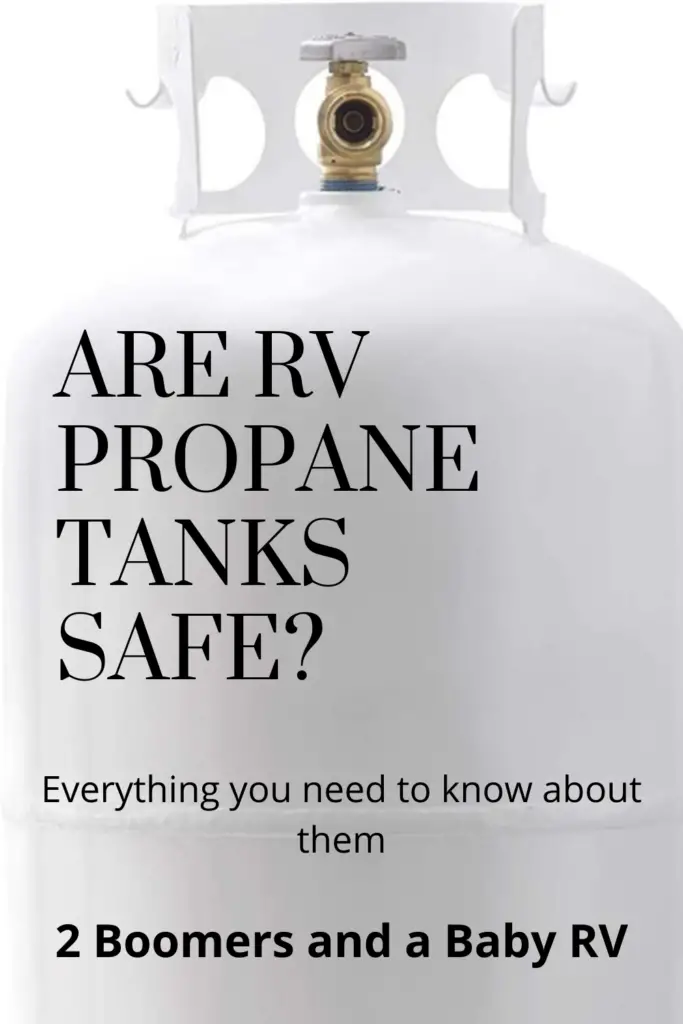Camping by definition is getting out in nature and roughing it a little. It seems these days more and more people are hitting the road and why not bring the comforts of home along with you? RVers and campers are bringing plenty of electronics with them and need a good way to provide power. Propane can come in handy and take a load off other power sources. The problem is making sure your fuel source does not run out and this is where RV propane safety and tank gauges come into play.
What are RV propane tanks and what are they used for?
RV Propane tanks are either removable or permanent tanks filled with propane used to power RV equipment and appliances. Ranging in a variety of sizes everywhere from 7 lbs. up to 420 lbs. depending on the RV.
These safe and handy tanks can provide a fuel source to run cooking devices, heaters, and ever most RV refrigerators. If you are someone that likes to get away someplace secluded, it can really be a lifesaver.
While your RV does rely on electricity to run some of its appliances, such as the microwave and air conditioner. Realize that propane can handle most of the rest. A quality solar setup combined with propane and you are set to get well off-grid for a while.

Where is a propane tank located in an RV?
DOT cylinders are used on travel trailers, fifth wheels, truck campers, and some small motorhomes. These tanks are commonly found mounted to the tongue or in a small outside storage area of the RV. Large Motorhomes have ASME tanks that are permanently mounted to the undercarriage and have a storage door providing access.
Are RV propane tanks safe to use?
Yes, propane is a very versatile, environmentally friendly, and safe energy source to use for camping and RV lifestyles. It is important to learn how to properly handle propane with care and perform simple inspections. There is also a rare case of a leak that you should be prepared to deal with. So, Are RV propane tanks safe?
If you ever find yourself in this position, open windows and doors, get out immediately and shut the gas off. Find a professional to inspect the system thoroughly before reuse.
Propane cylinders and onboard propane tanks
How do I know if I need to have my tank(s) inspected?
Both of these propane sources provide us with a convenient fuel to heat and cook with. There are a few differences in how these tanks are inspected and cared for.
- Propane cylinder – DOT cylinders are used on travel trailers, fifth wheels, truck campers, and some small motorhomes. These are approved by the Department of Transportation. DOT cylinders may be mounted in exterior compartments, or RV propane tank holders on the tongue or bumper of the trailer.
Portable DOT-certified tanks need to be inspected every 10 years and get recertified.
- Onboard propane tank – ASME tanks, used most often on motorhomes, are approved by the American Society of Mechanical Engineers. In this case, the RV propane tank mount is the frame of the motorhome itself, so ASME tanks are not removable.
ASME tanks do not need to be recertified but should be inspected regularly for damage.
If this whole process of an RV lifestyle is new to you, check this article on How to start the RV lifestyle process 101
DOT cylinder

ASME tank

Do’s and Don’ts with propane
DO’s
Do purchase a propane gas detector and carbon monoxide alarm. If battery-operated, replace the batteries at the start of each RV season.

Familiarize yourself with propane odor. Propane gas contains an odorant that smells like rotten eggs or boiling cabbage to assist with early leak detection.
Familiarize yourself with the manufacturer’s written operating and maintenance instructions.
Store and transport properly, securely, and in an upright position.
Do have portable propane cylinders inspected and recertified every 10 years
Open a vent or window, or turn on the range hood to remove moisture and combustion products (which may contain carbon monoxide) when using your propane stove or oven.
Don’ts
Store or use propane inside your RV, except for the manufacturer’s installed equipment.
Transport or use propane containers that are damaged, show signs of corrosion, have been exposed to fire, or appear to be leaking.
Use charcoal barbecues or portable liquid fuel camping equipment in your RV. Liquid fuels include kerosene, camp fuel, butane, gasoline, alcohol, lamp oil., etc.
Use stove burners or an oven for space heating. They are designed for attended cooking only.
Don’t forget your common sense, even though propane is a safe fuel source, precautions are still needed.
Are RV propane tanks safe?

Propane Tank Gauges
If you have ever run out of propane during a camping trip, you can relate to how frustrating it can be. Especially if you are in an RV, and have to break down camp, find a fill station, and then come back to camp just to set everything back up again.
This is why having a propane tank gauge or at least just having an idea of where you stand is so important.
An RV propane tank gauge is much different than the gas gauge in your truck or car. Instead of measuring the gallons of fluid left in your tank. it is measuring pressure. This measurement of pressure so it is fairly accurate but can be suspect at times. With that being said, It is more accurate than lifting the tank to estimate how much is left or tapping on the side. A better way to check propane levels when you don’t have a gauge attached is the hot water test. (see below for how-to)
What types of RV propane tank gauges are there?
A propane tank has two gauges. Most users are familiar with the gauge that is used to read how much gas they have in their tank, which is called a face gauge, or dial gauge. This gauge indicates how many gallons of propane a tank contains, and is expressed as a percentage. The other tank gauge is what is called a fixed liquid level gauge, or “bleeder valve”, which is used by delivery personnel during this tank fill process.
If your RV tank is not equipped with or needs replacement of the propane tank gauge, you have a few different options depending on the type of tank you have.
Portable or removable tanks you can attach right at the valve where the line connects.
DozyAnt Propane Tank Gauge Level Indicator Leak Detector Gas Pressure Meter Universal for RV Camper
The below gauge can be connected directly to the propane tank and your line can then be connected to the other end.

AP Products – Propane Tank Gas Level Indicator
This device attaches to the bottom of your propane tank and sends a signal via Bluetooth directly to your phone for quick readings without going outside.

Kona Propane Fuel Level Indicators – Magnetic & Reusable
The magnetic gas level indicator has a color scale that changes with the gas level. Easily removable, magnetic backing allows you to reuse it again and again for years to come. Works year-round in all weather conditions.

How to check propane levels without a gauge
If you are ever in a situation where you have a propane tank without a gauge or if you think the gauge is incorrect, try this!
This can be done for any propane tank whether in your RV or the one connect to your backyard BBQ grill.
Here is all you need to do:
- Fill a pitcher up with hot water (not boiling), just very hot tap water will do.
- Pour all the water down one side of the tank slowly. The whole tank does not need to be covered when doing this.
- Right after you have poured all the water, we want to run one hand along the area you have covered.
- What you are feeling for is a temperature change in the metal of the tank.
- Where there is no propane the metal will heat up slightly, but if it is in contact with propane it will not heat at all.
- The temperature of the propane is so cold that it will prevent the metal from warming up.
- That line between hot and cold is the exact location of the level of liquid propane inside the tank.
Keep in mind that propane tanks can only be filled to about 80% full. So if you find the level to be about 3/4 of the way up the side of the tank, it’s basically full.
Where can I get my RV propane tanks filled?
Remember, while they are filled by the gallon, propane tanks are designated by pounds. However, trailer-mounted propane tanks are typically removed and filled by pounds as they are weighed on a scale. Propane weighs 4.2 lbs per gallon, thus an 80lb ASME tank on a motorhome could hold up to 19 gallons, however, the OPD valve limits it to 80 percent, which would be approximately 15 gallons.
Frequently asked questions
How long does a 30-pound propane tank last in an RV?
A 30-pound propane tank will last 22 hours using a 30,000 BTU appliance. 30-pound tanks hold about 7 gallons of propane. 30,000 BTU is the average output for a gas grill, hot water heater, or furnace.
Smaller devices such as your RV refrigerator and RV stove will use significantly less propane. The refrigerator can run anywhere around 300 hours alone and an RV stove up to 100 hours by itself.
One gallon of propane on average can produce 92,000 BTUs, so a 30 lbs. propane tank can produce about 2,760,000 BTUs.
Can I drive with my propane on?
This can be a very heated debate on both sides of the fence. Yes, it is very common for RV owners to drive with their propane turned on. Really the dangers of a propane tank are no different in a wreck whether turned on or not. If you are unsure of your tank’s safety while driving, then how can you be confident when you get to your next stop and open it up?
I see no reason to turn it on while on the road, as my refrigerator can also run off of a 12V current and stay cold. Even without this option, most refrigerators will only lose about 4 degrees over an 8-hour period if sealed properly and not opened.
Another thing to be aware of is, that when at a gas station you need to shut the propane off, and in most states when going through tunnels they require propane to be shut off.
Do RV generators run off gas or propane?
Depends, In most cases, your built-in generator will pull fuel directly from your RV’s tank until there’s a quarter tank remaining (to prevent accidentally going empty). Some built-in RV generator models can run on gasoline, diesel, or propane. Check your owner’s manual to know for sure what fuel type you will be needing.
Conclusion
Most of us head out on our camping adventures in search of a little peace and quiet, away from the daily grind. With that being said, we also still want to enjoy the comforts of home from time to time. Several things make this possible onboard your RV including, the water and sewer system, electric hookups, and, of course, your RV propane tanks.
Some may think that propane is just for cooking dinner, but it can be used for much more. An RV can use propane to heat both you and water, your stove, refrigerator, BBQ grill, and run your generator in some models.
Propane can be even more of a lifesaver if you like to rough it a little and get off the grid. Boondocking locations have no water, sewer, or electricity for you to use, and propane will be your go-to. Your only other option is to have a solar power setup and they can be much less reliable than a good old propane tank.
Whatever your final choice ends up being, be smart, be safe, and enjoy this beautiful world of ours.





